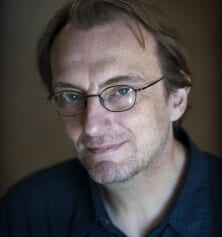
When an editor approached me about writing a history of the telescope, I immediately declined. I didn’t have a science background; I’d never written about science. I didn’t even like science. Then the editor said, “Think of it as an essay,” and I haven’t looked back.
What changed my mind was the realization that as a writer, I should be able to write about any topic, however seemingly daunting. And that lesson is at the heart of what I try to teach students of Creative Nonfiction: the element of narrative. Facts are facts, but the tools of fiction—characters, conflict, dialogue, action, setting—can transform useful information into compelling tales. My educational and professional background is in both fields—journalism and fiction—and I’ve found that by combining my experience in conducting research with my experience in constructing narratives, I can make even a deeply esoteric subject accessible to a general readership.
For instance: In my most recent book, The 4% Universe: Dark Matter, Dark Energy, and the Race to Discover the Rest of Reality, I tell the behind-the-scenes story of the discovery that won the 2011 Nobel Prize in Physics; the narrative includes such novelistic elements as bitter rivalries and fruitful collaborations, blind alleys and eureka moments. The science involves the accelerating expansion of the universe, but the human element—the scientists—is what drives the narrative.
My two previous books also cover the history and philosophy of science for non-specialist readers, Seeing and Believing: How the Telescope Opened Our Eyes and Minds to the Heavens (Viking, 1998), and The Invisible Century: Einstein, Freud and the Search for Hidden Universes (Viking, 2004). So does the book I wrote with Temple Grandin, The Autistic Brain: Thinking Along the Spectrum, (Houghton Mifflin Harcourt, 2013). As will my forthcoming book: The Trouble With Gravity: Solving the Mystery Beneath Our Feet (Houghton Mifflin Harcourt, 2019).
Throughout this surprising (to me) evolution in my writing, I have always asked myself two questions that I also encourage students to ask of themselves:
- Have I explained this topic in such a way that I would have understood it before I started my research?
- Have I found a way to illuminate the human drama that is at the heart of every narrative, whether fact or fiction?
If the answers are yes, then maybe I am — we are — heading in the right direction.